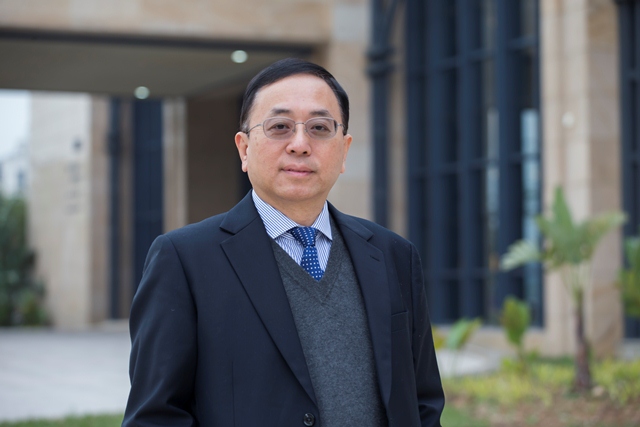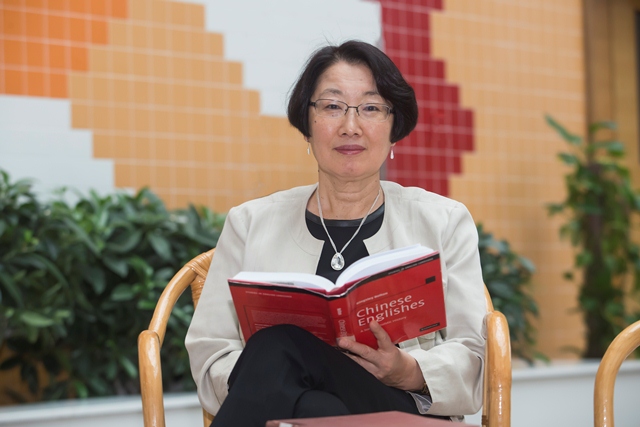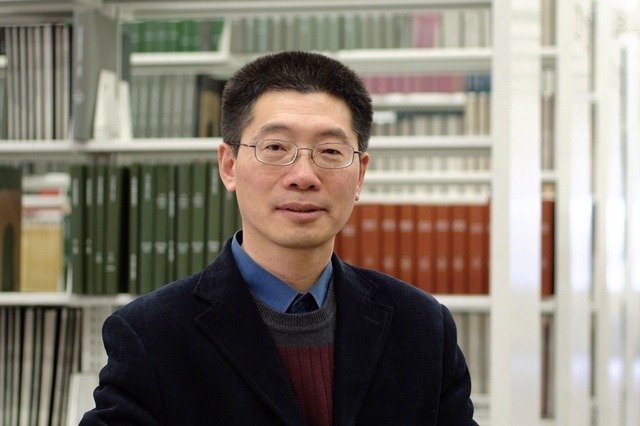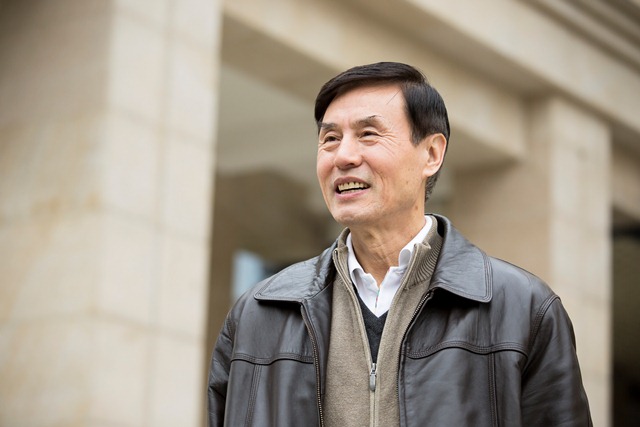Source:
umagazineTeaching and research are two core missions of a university. Over the past few years, UM has hired numerous world-renowned scholars through global recruitment, including the computer scientist, Chair Professor Lionel M Ni, vice rector for academic affairs; the physicist, Prof Da-Hsuan Feng, director of the Global Affairs Office and special assistant to the rector; the cancer research expert, Chair Professor Chuxia Deng, dean of the Faculty of Health Sciences; the linguist, Chair Prof Hong Gang Jin, dean of the Faculty of Arts and Humanities; the pharmacologist, Chair Professor Richard Dequan Ye, deputy director of the Institute of Chinese Medical Sciences; the historian, Distinguished Professor Haijian Mao; and the linguist, Distinguished Professor De Bao Xu. The addition of these new scholars, all of whom have outstanding achievements in their respective areas of expertise as well as widespread influence in international academic circles, is expected to elevate UM and provide momentum for UM to achieve the goal of becoming a high-quality world-class university with regional characteristics.
In this issue of umagazine, we interview four of these newly-recruited scholars, including Chair Professor Lionel M Ni, Prof Da-Hsuan Feng, Chair Professor Hong Gang Jin, and Chair Professor Chuxia Deng, about how they plan to lead the university to make progress in various areas.
Chair Professor Lionel M Ni:
Interdisciplinary Collaboration Is an Indispensable Step in Building a First-class University
UM’s Vice Rector (Academic Affairs) Prof Lionel M Ni is a world-renowned computer scientist, with outstanding academic achievements and rich managerial experience. Prof Ni was formerly chair professor, head of the Department of Computer Science and Engineering, and dean of the Fok Ying Tung Graduate School, at the Hong Kong University of Science and Technology (HKUST). Prof Ni expressed great excitement about his new career at UM. “I am excited to have the opportunity to work with an excellent senior management team to realise the vision and mission laid out by the University Council,” said Prof Ni.
Prof Ni’s career is distinguished by his mentorship and outstanding research. His achievements in computer sciences have earned him substantial recognition. His research findings are highly cited by his peers. He has supervised 54 PhD students. In 2011, he received the Second Class Award in Natural Sciences for Research Excellence from the State Council of China. In his more than two decades of professional life in the United States, he served with distinction at Michigan State University (MSU) where he moved from assistant professor to full professor before assuming his office at HKUST. Upon returning to Asia, Prof Ni was invited by Hong Kong and mainland China to serve in many vital capacities, including the chief scientist of a project under the Ministry of Science and Technology’s 973 Programme; director of the HKUST MOE/MSRA Information Technology Key Laboratory, Hong Kong; and affiliate professor and founding director of the Institute of Advanced Computing and Digital Engineering, Shenzhen Institutes of Advanced Technology, Chinese Academy of Sciences, Shenzhen.
Familiar with the Ecology of Higher Education
Having worked in higher education for many years in the US, mainland China, Taiwan, and Hong Kong, Prof Ni is very familiar with the ecology of higher education. “Interdisciplinary collaboration is an indispensable step in building a first-class university, especially in today’s world where social forms, science and technology, as well as the ecological environment are experiencing rapid changes,” said Prof Ni. “UM is a comprehensive university, with academic programmes covering various areas, and this provides a very good platform for interdisciplinary collaboration. We can consider developing some innovative interdisciplinary programmes; this way we would have a chance to get ahead of other universities instead of just doing the catching-up. Of course one of the challenges in interdisciplinary collaboration is departmentalism, and we need to overcome this challenge. Although UM has relatively abundant resources, we still need to be selective about which disciplines to give priority. We need to consider the strengths of our scholars and students as well as regional demand.”
Leading UM to New Academic Heights
Prof Ni has high expectations for UM’s academic development. “If a university wants to achieve academic excellence, it must have outstanding faculty and students as well as a good management system,” Prof Ni said. “Considering UM’s strategy for future development, one of my most important tasks is to continue recruiting first-class scholars from around the world. Of course for our current faculty members who are making a contribution to UM, we must provide good working conditions for them to grow into first-class scholars. Attracting outstanding students would be a greater challenge, especially given the declining number of students worldwide. Every university is competing for the best students. I will work closely with various departments to come up with a workable plan to attract more outstanding students. ”
Despite these foreseeable challenges, Prof Ni is still confident that he could lead UM to new academic heights. “In addition to pursuing academic excellence, I also hope to use my knowledge in computer sciences to make some contributions to the university in terms of effective management, development of new disciplines, and interpersonal relationships.”
Prof Da-Hsuan Feng:
Assisting UM to Develop Global Affairs Strategies Suited to the 21st Century
Prof Da-Hsuan Feng, director of the Global Affairs Office, is an eminent physicist, an expert in the fields of nuclear and nuclear astrophysics, quantum optics, and mathematical physics, and a fellow of the American Physical Society. Prof Feng also has outstanding achievements and rich experience as a scholar, researcher and leader in university development. “I have confidence in UM’s future development,” said Prof Feng. “I will assist the university to formulate and implement global affairs strategies and expand UM’s international networking, to help UM leave a deeper international footprint.”
Over 30 Years of Experience Working at Universities and Companies in the US and Taiwan
Prof Feng was born in India, grew up in Singapore, and received education in the US. He has more than 30 years of experience working at numerous universities and companies in the US and Taiwan. He was M Russell Wehr Chair Professor of Physics at Drexel University, director of the Division of Theoretical Physics of the United States National Science Foundation, vice president for research and economic development at the University of Texas at Dallas and professor in its Department of Physics, vice president of Science Applications International Corporation (a Fortune 500 company), and senior vice president at Tsing Hua University and Cheng Kung University in Taiwan. Prof Feng has maintained close contact and collaborations with universities and other organisations in Europe, North America, and Asia. He has served as advisor and board member at numerous national labs and high-tech companies in the US; visiting professor and honorary professor at 13 top universities in mainland China; as well as board member and advisor for science and technology at several universities in mainland China, Malaysia, and Indonesia.
“UM needs a multi-pronged global affairs strategy.”
“UM needs a brand new, multi-pronged global affairs strategy to lead its global affairs to new heights, and this will present an enormous challenge for my work,” Prof Feng said. “Macao enjoys a unique position in the four Chinese-speaking regions [mainland China, Hong Kong, Taiwan, and Macao], and the Macao SAR government attaches great importance to higher education. These have helped UM secure a new campus that is 20 times larger than the old campus, or about one thirty the size of Macao. And now the whole world has high expectations for higher education in Macao.”
Exploring Strategic Partnerships with Other Parts of the World
Prof Feng hopes to draw on his rich experience and his network of contacts with universities around the world to assist UM to develop global affairs strategy suited to the 21st century. In addition to maintaining good relationships with existing partners, Prof Feng will also seek to expand UM’s strategic relationships with other parts of the world. By forging such strategic relationships, Prof Feng hopes that UM will leave a deeper international footprint.
Chair Professor Chuxia Deng:
Assisting the FHS to Make Important Scientific Discoveries
Chair Professor Chuxia Deng, dean of the Faculty of Health Sciences (FHS), is an expert on cancer research. He was a senior investigator of the Senior Biomedical Research Service (SBRS) at the United States National Institutes of
Health (NIH), chief of the Mammalian Genetics Section at the United States National Institute of Diabetes and Digestive and Kidney Diseases (NIDDK), investigator of the NIDDK’s Genetics of Development and Diseases Branch,
and postdoctoral fellow of the Howard Hughes Medical Institute and the Department of Genetics at Harvard Medical School.
“The new campus brings unprecedented opportunities, but it also brings challenges,” said Prof Deng. “I hope to contribute my knowledge to the development of education and science, and it is a great honour to be a part of
UM’s team effort to develop the university into a world-class institution.”
Contributions to Research in Pathogenic Mechanism of Breast Cancer
Prof Deng has outstanding achievements in academic research and administrative management. He has made significant contributions to research on cancer and metabolic diseases, cancer and ageing, cancer stem cells, and the breast cancer susceptibility gene, BRCA1, particularly to research on the pathogenic mechanism of breast cancer. He is the author
or co-author of over 310 papers with a total citation frequency of over 30,000 and an H-index of 96. He is a tenured investigator of the NIDDK, and a fellow of the American Association for the Advancement of Science. He
has received numerous awards in recognition of his outstanding achievements in teaching and research, including the NIH-APAO Outstanding Achievement Award from the NIH, USA; the Outstanding Overseas Scholar from the National Science Foundation, China; and the NIDDK Director’s Award from the NIDDK.
Recruiting First-class Scientists
Founded in 2013, the FHS will conduct basic research, applied research and translational research in several major areas of life sciences, including chronic diseases, ageing, immunology, infectious diseases, neurological disorders, and cancer. “We will recruit first-class scientists and build first-class research facilities,” said Prof Deng. “I think the FHS is comparable to top research institutions in mainland China and the US in terms of research environment and research quality.”
Focusing on Building State-of-the-Art Infrastructure
Prof Deng is very confident in the FHS’s future development. “I will focus on building a state-of-the-art infrastructure and operating system for the faculty to realise first-class teaching and research. I will also carry out research in the fields of cancer, medical sciences, and health care, and assist the faculty to make important scientific discoveries to fill the gaps in these areas in Macao,”said Prof Deng. “The long-term goal of the FHS is to attain a top global ranking as a research and teaching institution, with commensurate visibility, in a broad range of disease-related biological, translational and medical research. ”
Chair Professor Hong Gang Jin:
Establishing New Development Strategies according to the FAH’s Strengths
Chair Professor Hong Gang Jin, dean of the Faculty of Arts and Humanities (FAH), is an eminent linguist, with outstanding achievements and rich experience in empirical research, teaching, and administration. She was William R Kenan Professor of East Asian Languages and Literatures and a professor of Chinese at Hamilton College. She also served as the general director of the Associated Colleges in China headquarters. She is very excited about her new position as the dean of the FAH. “I feel very honoured to have the opportunity to work with my new colleagues and students to create a world-class university,” said Prof Jin.
Over 20 Years of Teaching and Research Experience
Prof Jin has over 25 years of experience in teaching and research as well as ten years of experience in collaborative research with universities in the United States, Taiwan, Singapore, Hong Kong, and mainland China. She has secured several major federal and private grants from the US, mainland China, and Taiwan. She has also served as the president or a member of the board of directors at numerous teachers’ associations in the US. She is currently the chair of the AP Chinese Development Committee. “UM students’ ability to communicate across different languages and cultures not only gives the FAH an advantage in teaching and research, but also serves as a solid foundation on which we can develop the FAH into a faculty with local characteristics,” said Prof Jin.
Bringing Philosophies of Liberal Arts Education to UM
Prof Jin noted that UM is determined to become a world-class university, as is reflected in its unique “4-in-1” model of education that meets the demand of the 21st century, its dual emphasis on teaching and research, as well as its comprehensive reforms in various areas including the establishment of Asia’s largest residential college system. “I have received education in the US, and I have worked as an education professional at liberal arts colleges in the US for many years,” Prof Jin said. “I have experienced firsthand how liberal arts education emphasises well-rounded development and how it impacted the students’ lives and helped produce outstanding graduates for the US society. I hope to bring the philosophies and advantages of liberal arts education that I know to Macao so we could also produce world-class graduates.”
Establishing Teaching Reform Plan and Evaluation Criteria for Academic Programmes
Prof Jin believes that a successful faculty is built on three cornerstones: a research-oriented faculty in line with international trends, a scientific curriculum and an outstanding faculty team, and an abundant supply of diligent students of diverse origins.
Prof Jin plans to formulate new strategies for the FAH’s future development according to these three considerations and the FAH’s strengths and advantages. “We will expand a research-oriented faculty team in line with international trends, and systematically review the current curriculum setup and teaching process so as to establish a scientific set of evaluation criteria for academic programmes and a teaching reform plan.” On the student recruitment front, Prof Jin hopes to attract outstanding students not only from Macao, but from overseas as well. She also hopes that the multilingual and multicultural environment of the FAH will expose students to different disciplines in the field of the humanities, such as linguistics, literature, history, philosophy, and religion, thereby guiding students to explore different human experiences in different parts of the world, acquire positive morals and values, as well as develop a global mindset.
Other Recently Recruited Renowned Scholars
Chair Professor Richard Dequan Ye
Deputy Director of the Institute of Chinese Medical Sciences
Chair Professor Richard Dequan Ye is an established pharmacologist specialised in receptors and innate immunity. He has 27 years of research experience in the United States and was recruited from overseas in 2010 through China’s 1000 Experts Programme. Prior to joining UM, Prof Ye served as the dean of the School of Pharmacy at Shanghai Jiao Tong University.
Before returning to China, Prof Ye successively served as an assistant professor and associate professor at the Scripps Research Institute in the United States, and later received a tenured appointment at the University of Illinois College of Medicine and worked as a professor of pharmacology. His research focuses on G protein-coupled receptors (GPCRs) that recognise chemoattractants and mediate the activation of innate immune cells. He has applied signal transduction mechanisms to high-throughput screening of drug leads. Prof Ye has authored or co-authored more than 160 research articles, which have been cited for more than 9000 times. He has collaborated with pharmaceutical industry leaders such as Johnson & Johnson and Novartis in new drug discovery. Prof Ye has served as an associated editor of the American Journal of Physiology – Lung Cellular and Molecular Physiology, member of the editorial board of Molecular Pharmacology, and section editor of The Journal of Immunology. He has been an associate editor of Pharmacological Reviews since 2014.
Distinguished Professor Haijian Mao
Distinguished Professor Haijian Mao is a renowned historian. His research on the modern and contemporary histories of China, especially on the two Opium Wars and the Reform Movement of 1898 in Qing dynasty, has earned him recognition from his peers. He is a Distinguished “Changjiang” Professor of the Ministry of Education. He was formerly a professor of history at East China Normal University and dean of its Si-Mian Institute for Advanced Studies in Humanities; research fellow of the Institute of Modern History, Chinese Academy of Social Sciences; and professor of the Department of History at Peking University. He has given lectures at universities in Japan, Hong Kong, the United Kingdom, Taiwan, and South Korea. He is a prolific writer, and his main works include The Collapse of the Heavenly Dynasty: A Restudy of the Opium War, and From 1895 to 1898: The Textual Research and Annotations on Kang Youwei’s Autobiography, Woshi [my history]
Distinguished Professor De Bao Xu
Distinguished Professor De Bao Xu is a renowned linguist, with fruitful results and major academic impact in the theories of phonology, particularly Chinese phonology, and in teaching Chinese as a foreign language. Prof Xu has more than 30 years of experience in teaching, research and administration in the United States. He was formerly Leonard C Ferguson Chair Professor of East Asian Languages and Literatures and chairperson of East Asian Languages and Literatures Department, at Hamilton College, United States, and chair professor of the College of Humanities at Beijing Normal University’s Zhuhai campus. Prof Xu is a prolific writer. He has authored or co-authored ten books and more than 80 articles and papers on theoretical linguistics, Chinese linguistics, and CALL study in teaching Chinese as a second language. He is a co-editor-in-chief (with Prof James Huang from Harvard University) of Contemporary Linguistic Theory Series, published by the China Social Sciences Press.








